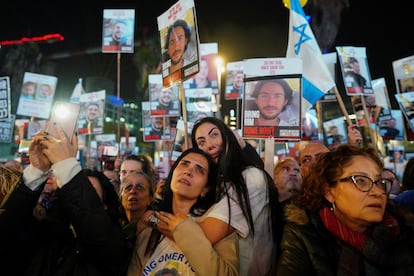Gaza war reaches 100 days without Israel eliminating Hamas or freeing the hostages
The 2.3 million inhabitants of Gaza are at risk of severe food insecurity, according to the U.N. World Food Program, and half a million more are already on the verge of a ‘catastrophic’ famine


The winter rains falling on the Middle East on Sunday drenched the refugee camps containing hundreds of thousands of displaced people in southern Gaza, as well as tens of thousands of demonstrators in Tel Aviv demanding the release of over 100 hostages held captive in the enclave since the Hamas attacks against Israel on October 7, 2023. The war is now in its 100th day, nearly 24,000 Palestinians have been killed and 7,000 are missing, and Prime Minister Benjamin Netanyahu’s government has not achieved its goals of bringing the captives home and eradicating the Palestinian militia, which it is still fighting in the center and south of the coastal enclave. Two societies are now surviving in a state of post-traumatic stress amid a conflict with no end in sight. The entire Gazan population, crowded according to the United Nations in a devastated territory alien to the human condition. And at least a third of Israelis, according to a study that also shows the population’s support for the continuation of hostilities in Gaza.
The Gaza conflict is already the bloodiest war since the birth of the State of Israel in 1948. It has provoked the greatest exodus of civilians since the Palestinian Nakba of that same year, as well as the highest number of Israeli fatalities (1,200) in a single day. “The war may last for many more months,” Netanyahu, who has linked his political future to the fight against Hamas, announced Sunday as he presented an extraordinary defense budget at the weekly Cabinet meeting.
The 2.3 million inhabitants of Gaza are at risk of severe food insecurity, according to the U.N. World Food Program, and half a million more are already on the verge of a “catastrophic” famine. The collapse of telephone and internet communications in the enclave prevents the status of population from being properly assessed, and Israel has prohibited the international press from entering Gaza, unlike during the 2014 conflict.
The routine of the war has continued almost without interruption for 100 days. Tanks and fighter jets opened fire Sunday on units of the Izz ad-Din al-Qassam Brigades, the armed wing of Hamas, in Khan Younis in southern Gaza, and the refugee camps at Bureij and Maghazi in the center of Gaza, where heavy clashes were fought. The Gaza Ministry of Health reported a further 125 Palestinian deaths. Most of the enclave’s hospitals are out of service.
Israel’s military declared last week that it had entered a new phase of the war that would move away from massive bombardments and focus on operations against specific targets. On Saturday, Netanyahu again ruled out a ceasefire until Israel has crushed Hamas’ militia forces.

“War is itself a crime against humanity,” Pope Francis said from the Vatican in an appeal for people to pray for those who are suffering due to the “cruelty of war” in Ukraine, Palestine and Israel. Commissioner-General of the United Nations Relief and Works Agency for Palestine Refugees in the Near East (UNRWA) Philippe Lazzarini also condemned the prolongation of the conflict. “The massive death, destruction, displacement, hunger, loss, and grief of the last 100 days are staining our shared humanity,” he said in a statement.
Over two-thirds of Gaza’s residential buildings have been partially or completely destroyed, and nine out of 10 residents have had to flee their homes. “Many will carry lifelong scars, both physical and psychological,” the UNRWA official warned. “An entire generation of children is traumatized and will take years to heal. International Humanitarian Law, put in place to protect civilians and regulate the conduct of hostilities, is regularly flouted. Despite repeated calls, a humanitarian ceasefire is still not in place to stop the killing of people in Gaza and enable the safe delivery of food, medicine, water and shelter.”
Dozens of makeshift camps and shelters in UNRWA facilities and schools in Gaza have been flooded by heavy rains. “Many displaced people no longer have anywhere to shelter,” agency officials say. “The onset of winter is making life even more unbearable, especially for those living outdoors.”
“It’s been 100 days, yet we will not stop until we win,” said Israeli Defense Minister Yoav Gallant. Rebecca Brindza, spokeswoman for the families of the hostages in Gaza, as quoted by Reuters, said “no one will win” as a result of the war. Of the 240 people captured on October 7 by Hamas, 136 remain in Gaza, although some 20 of them may already be dead. On Sunday, the first working day of the week in Israel, over 150 companies supported a partial strike lasting 100 minutes to remember the hostages.
Over the weekend, tens of thousands of demonstrators gathered in front of the Tel Aviv Museum of Art to demand the release of the hostages. Israel has rejected a Qatari proposal to recover all the captives in exchange for allowing the departure of Hamas leaders in Gaza — including the organization’s political chief, Yahya Sinwar, and its military chief, Mohamed Deif — as well as the withdrawal of all its forces from Gaza.
Various politicians addressed the protestors. The mayor of the northern city of Haifa, Labor’s Einat Kalisch-Rotem, who has a family member among the hostages, called for new leaders to “prudently and sensibly” advance negotiations to free the hostages. Israeli actress Gal Gadot also sent a video recording to the families of the captives: “You are heroes and we all will do what we can to bring them home, there’s no other option,” she said.
Sign up for our weekly newsletter to get more English-language news coverage from EL PAÍS USA Edition
Tu suscripción se está usando en otro dispositivo
¿Quieres añadir otro usuario a tu suscripción?
Si continúas leyendo en este dispositivo, no se podrá leer en el otro.
FlechaTu suscripción se está usando en otro dispositivo y solo puedes acceder a EL PAÍS desde un dispositivo a la vez.
Si quieres compartir tu cuenta, cambia tu suscripción a la modalidad Premium, así podrás añadir otro usuario. Cada uno accederá con su propia cuenta de email, lo que os permitirá personalizar vuestra experiencia en EL PAÍS.
¿Tienes una suscripción de empresa? Accede aquí para contratar más cuentas.
En el caso de no saber quién está usando tu cuenta, te recomendamos cambiar tu contraseña aquí.
Si decides continuar compartiendo tu cuenta, este mensaje se mostrará en tu dispositivo y en el de la otra persona que está usando tu cuenta de forma indefinida, afectando a tu experiencia de lectura. Puedes consultar aquí los términos y condiciones de la suscripción digital.








































